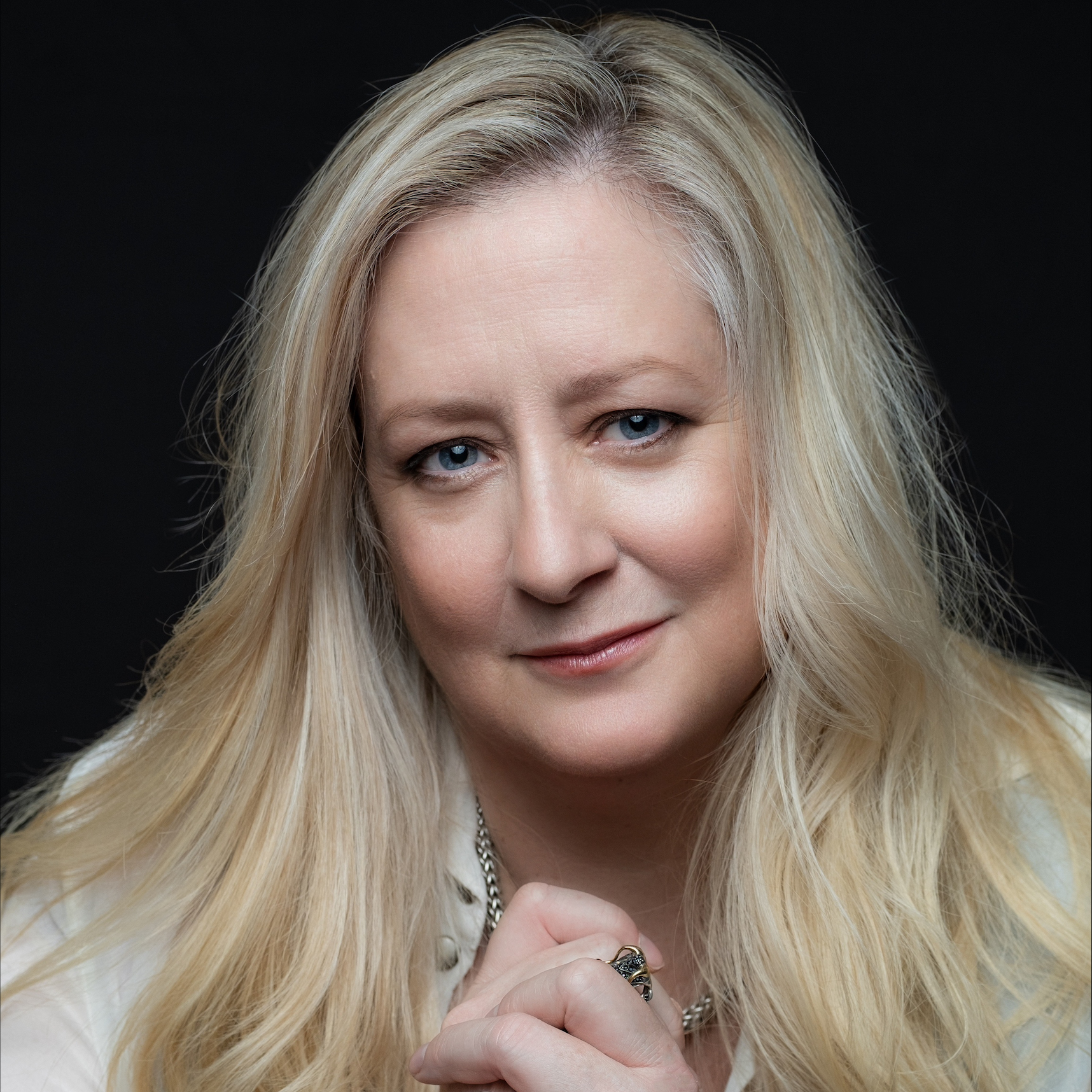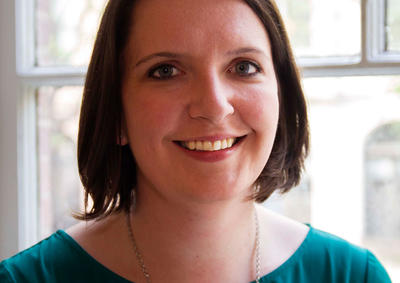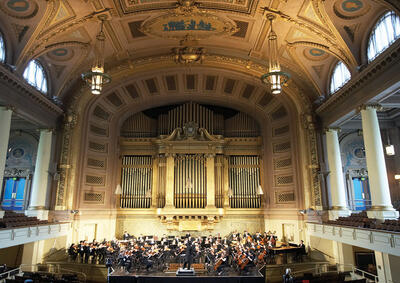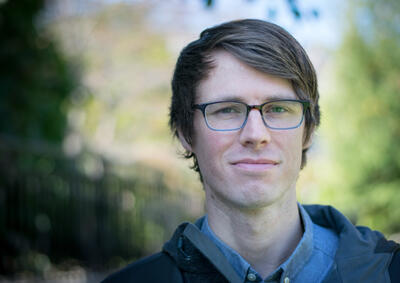Flutist Tara Helen O’Connor says “mentoring is doing”
In September, the School of Music welcomed flutist Tara Helen O’Connor to the faculty. O’Connor, who serves as Visiting Associate Professor (Adjunct) of Flute, recently shared insights into the career she’s cultivated, her approach to teaching, and the state and future of classical music.
Q: You work as a soloist and in chamber music settings, on recordings and film soundtracks, and in performances of new music and more familiar repertoire. How did you develop such a diverse performance career, and what fuels you in that regard?
A: The journey of a musician is quite complicated and often multifaceted. I often tell my students that the career path is like weaving a tapestry. While focusing energies on current pursuits, behind you is a beautiful tapestry that shows each person’s journey featuring their own musical experiences.
As a young flutist growing up on Long Island, there were wonderful performance opportunities in both youth orchestras and chamber music festivals. When I began my studies at SUNY Stony Brook with the late Samuel Baron, I was both actively pursuing orchestral and chamber music opportunities. As I delved deeper into these experiences, I began to perform a lot of new music. I loved the challenges of the notation, the complexity, the creation of new sounds and techniques. I particularly enjoyed the process of being able to work with living composers. While still in school, I formed an ensemble with like-minded colleagues. We learned to write grants and began to work on projects with composers at Princeton and Columbia University. Recordings of our group were being sent by composers to arts organizations, so my playing was being heard by presenters. We performed and recorded many newer works and eventually we won the Walter W. Naumburg Chamber Music Award. This helped get both the name of my group and my own name out into the world. Additionally, I was playing in other groups and orchestras, which led to more and more performance opportunities.
While the path of a young artist happens gradually, I can pinpoint two amazing opportunities that really helped me further my career. The first was a recording project for the 75th birthday of Isang Yun. While still in Stony Brook finishing my DMA, I was asked by a teacher if I wanted to record Yun’s Five Flute Etudes. I immediately said yes even though I didn’t own all the instruments. I found a way to purchase what I needed and wound up losing money on the project. However, the gain was far more than I ever could have imagined. These Five Etudes wound up on a CD of Yun’s music, called Fanfare & Memorial with Lorin Maazel conducting the Berlin Philharmonic and Heinz Holliger conducting the Scharoun Ensemble. It was presented to the composer on his 75th birthday in North Korea. It was quite an honor and it also meant that when someone called to ask for my materials, I could also include this impressive CD project as part of my portfolio.
Perhaps the biggest life-changing opportunity came when the Chamber Music Society of Lincoln Center began the Bowers Program for emerging artists. Originally called Chamber Music Society Two, I was awarded a spot and became the first flutist in the very first year of the program. This led to more high-profile work in New York and invitations to major music festivals all over the country.
Collaborating with colleagues has led to all of my performance and recording opportunities. Each opportunity has led to the next and while it seems quite circuitous, I would say it all happened slowly but very steadily. Also, as I reflect upon my studies with my flute teachers, my career very closely resembles theirs; teaching and performing. I absolutely love my life. I am filled with gratitude every minute for my wonderful colleagues and for each and every opportunity.
Q: What is your approach to pedagogy and what do you learn through teaching?
A: There is a tremendous amount of responsibility that comes with being a pedagogue. I think it is safe to say that we all feel this overwhelming responsibility to pass on the knowledge we have all gleaned throughout our lives. While teaching our own students to become their own teachers and the pedagogues of tomorrow, we ensure that the next generation will be able to continue to carry the legacy of the past and immediate present into the future. It is essential for the survival and growth of our beloved art form.
Teaching is a process that inspires me and consumes my interest. I love the challenge of it, as it forces me to be clear, consistent, and concise. Through teaching, as I work to address a technical issue or musical idea, I learn so much about my own playing. It forces me to analyze my own process and I find the exchange of ideas with my wonderful students in lessons always inspiring.
Another important component of my teaching philosophy is the concept of “MENTORING IS DOING.” It is important for my amazingly talented Yale School of Music students to see that I have this strong commitment to my art and that I continue to perform, record, collaborate, and teach. My sometimes-dizzying concert and recording schedule is a testament to this and it is clearly my life’s passion.
Personally, I love the flute. I love the sounds it can make; it’s range of color and the directness of the physical and emotional experience while playing it. I want others to love it as I do, and I enjoy the challenge of finding new ways to inspire and motivate each individual.
Q: What does the future of classical music look like to you, and what role do music schools and conservatories play in shaping what our field will look and sound like in the years to come?
A: As human beings, we seek to create art, to seek beauty, to express our emotions, thoughts, and beliefs. We have this intense desire to share this experience with others. As I speak with my colleagues and students, it seems to me that there are even more people studying music today, and this is so exciting for the future of classical music. I have also found that more performers are writing and playing their own music. Social media, technology, and self recording allows artists to immediately share their own work to larger audiences. Driven by the need to share and create, there are more concerts in unconventional venues and more performance opportunities as artists form new ensembles and work more collaboratively. Building on the music of the past, our musical palette continues to expand. Both through the interesting and unconventional combinations of instruments and with the incorporation of technology, composers are able to experiment with an even greater range of sonorities. Additionally, cross collaboration between different art forms and cultures brings a wider range of experiences and voices to newer audiences.
Music schools and conservatories play such an important role in shaping how our field develops. I think of them as giant “incubators” filled with new creators. They are essential in both fostering fresh ideas and new works. It is also a place to study and hear these new creations as they take their place in the giant continuum of classical music. The collaborations inside our walls build bridges to the outside world and deepen the connections to the ever-growing musical community and the community at large.






